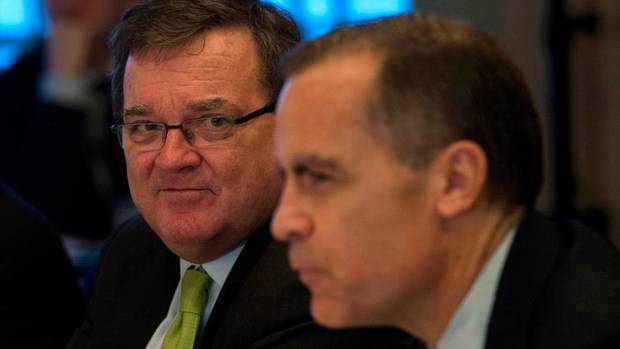 Jim Flaherty is setting a high bar for boosting the Canada Pension Plan, saying any move to increase benefits and premiums must have the unanimous support of provinces and territories given the importance of the program.
Jim Flaherty is setting a high bar for boosting the Canada Pension Plan, saying any move to increase benefits and premiums must have the unanimous support of provinces and territories given the importance of the program.
The Finance Minister’s position goes beyond the rules for amending the CPP, which mirror the formula for constitutional amendments and require the support of two-thirds of the provinces representing two-thirds of Canada’s population.
This article was published by The Globe and Mail on Dec. 14, 2012. To see this article and other related articles on The Globe and Mail website, please click here
“I would not want to move ahead without everybody being on board,” Mr. Flaherty told reporters Friday on Parliament Hill as he laid out his priorities for his upcoming meeting with provincial and territorial finance ministers. “I think it’s quite important in the federation that if you’re going to do something fundamentally with respect to the Canada Pension Plan, we really try to do it all together.”
As first reported by The Globe, CPP reform is back on the official agenda of Canada’s finance ministers, who will gather for dinner Sunday in Ottawa followed by meetings Monday at Meech Lake. The ministers meet face-to-face every December, each time in a different location.
Mr. Flaherty said his priority for the meeting is jobs and the economy, not CPP reform, but he expressed an openness to enhancing the program if there is consensus. The minister said he does not support immediate CPP increases given the state of the economy, but said one “reasonable” option on the table is to have increases begin once the economy has recovered.
“That’s one of the options. I think we’ll have that discussion this weekend and it is something we could do going forward,” he said. “It’s a reasonable position to take I think because our concern always is jobs and growth.”
Mr. Flaherty had previously been in favour of enhancing the CPP but switched his position in December, 2010. At that time, Alberta and Quebec did not support CPP changes and Mr. Flaherty said there was no consensus.
Ottawa’s request for unanimous support of any CPP change will mean increased focus on Alberta and Quebec at the meetings. Alberta’s Finance Minister Doug Horner told The Globe this week he’s “open to the discussion” on CPP reform, but that his government’s position has not changed. Quebec recently signalled an openness to CPP reform in its November budget.
News that the finance ministers will debate specific proposals for a “modest” increase to CPP benefits and premiums met with strong reaction Friday from both sides of the heated debate.
Dan Kelly, the president of the Canadian Federation of Independent Business, called the development “incredibly disturbing.”
The CFIB lobbied Mr. Flaherty and Prime Minister Stephen Harper directly in 2010 in a successful effort to get the government to stop supporting CPP increases.
Mr. Kelly said businesses simply cannot afford a job-killing “payroll tax,” given that CPP premium contributions are split 50/50 between employers and employees.
“They have no money to do it,” he said. “There’s somehow this assumption that Canadian businesses – particularly small employers – are sitting on pots of gold here. … For finance ministers to talk about increasing taxes for 10 straight years on employers, I think is lunacy.”
Meanwhile supporters of CPP enhancements – including the seniors group CARP, labour groups and the NDP – said the meeting is a rare opportunity for action that will help Canadians prepare for retirement.
NDP MP Guy Caron said CPP is becoming even more important because it provides a defined benefit in retirement at a time when more and more private pension plans are moving to defined contribution, meaning the benefit in retirement is not guaranteed and depends on the success of personal investments. The NDP also takes issue with the minister’s insistence on unanimous support for any CPP change.
“You have a very large majority of provinces on board,” Mr. Caron said. “We believe that the current rules have been applied for CPP reforms in the past and should continue to apply in the future.”

